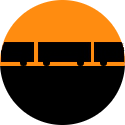Summer School at the Faculty of Transport,
Silesian University of Technology
Training description
Date of training: June 24, 2019 - July 3, 2019
Title of training: „Different aspects of transport on Upper Silesia Region – Różne aspekty transportu na Górnym Śląsku.”
Training profile: ACADEMIC
Target group: students of Transport and related faculties from Europe and other countries around the world, interested in transport issues in the industrial regions of Central and Eastern Europe.
Organizer: Faculty of Transport, Silesian University of Technology
Teaching language: English (level required at least B1, B2)
Training goals
- Acquiring knowledge in the field of transport issues in the area of Upper Silesia including aspects of the production of various means of transport, transport infrastructure facilities, the implementation of passenger and freight transport, the use of transport processes for the needs of the economy and society,
- Synthesis of acquired knowledge and its use in project work,
- Developing creativity in thinking and designing,
- Developing social competences and working in a group
Substantive description of the training
This training concerns broadly understood transport - both in the design, production and operation of various types of transport, organization of transport tasks and transport infrastructure and its use for the needs of the economy and society.
In Upper Silesia there are numerous thematic related objects with transport - from the component plant and entire vehicles (eg road vehicles and rail vehicles), through the airport, port, container terminal, to such means of transport as cableway and terrain-cableway. All these objects are part of everyday life of the inhabitants of the Silesian Voivodeship, the number of which is over 4.5 million people.
The training consists of two parts - the cognitive part and the practical part.
The cognitive part
It includes lectures, local visions, guided tours (lectures, in situ), meetings with experts and representatives of local enterprises operating in the Automotive, transport and transport industry. The presented examples relate to transport, production, infrastructure and social aspects.
Range of lectures
- Automotive industry in the area of Upper Silesia - from parts and subassemblies to entire vehicles,
- Production of rail vehicles - from Silesia to global markets,
- Airport in the Silesian Agglomeration - our window to the world,
- Port and Canal Gliwice - road to the Baltic Sea,
- Public transport in the Upper Silesia as Metropolis,
- Logistics centres,
- Recreational use of means of transport - ropeways and cable-terrain
Practical part
It includes workshops on selected aspects of designing elements of means of transport using computer aided design, diagnostics of means of transport based on measurement systems and on board self-diagnostics, transport infrastructure, automotive technical facilities and their use in servicing automotive means of transport. Students, through the synthesis of their own experience related to transport in the mother country and the knowledge gained during training on transport in Upper Silesia, will suggest a solution to the selected problem on the subject of transport.
Scope of workshops:
- Designing means of transport using computer aided (moderated by tutors),
- Diagnostics of means of transport based on measurement systems and self-diagnostics on board (moderation by tutors),
- Motor technical facilities and their use in servicing motor vehicles (moderated by tutors),
- Creative work - brainstorming and working hypotheses (moderation by tutors),
- Design works (moderation by tutors),
- Final presentations
Educational outcomes:
- The student has knowledge in the field of selected transport issues,
- The student has knowledge of selected issues of construction and operation of means of transport,
- Student is able to design a simple element of the means of transport using computer support,
- The student has the skills in the use of techniques and tools for the implementation and presentation of the project,
- The student is able to work creatively in a group
Total number of hours: 150 (contact and non-contact hours)
Obtained ECTS points: 6
Price: 530 EURO
